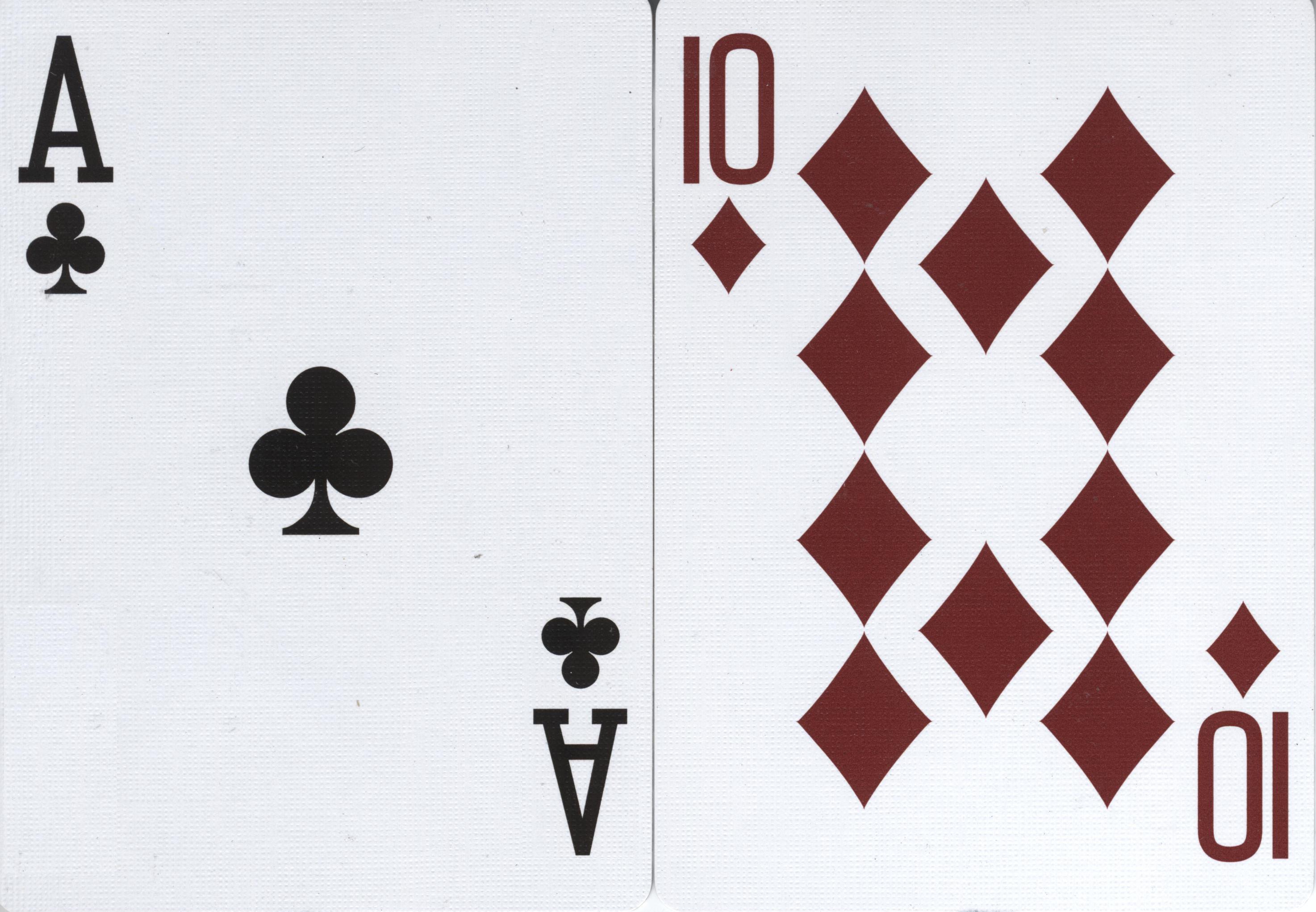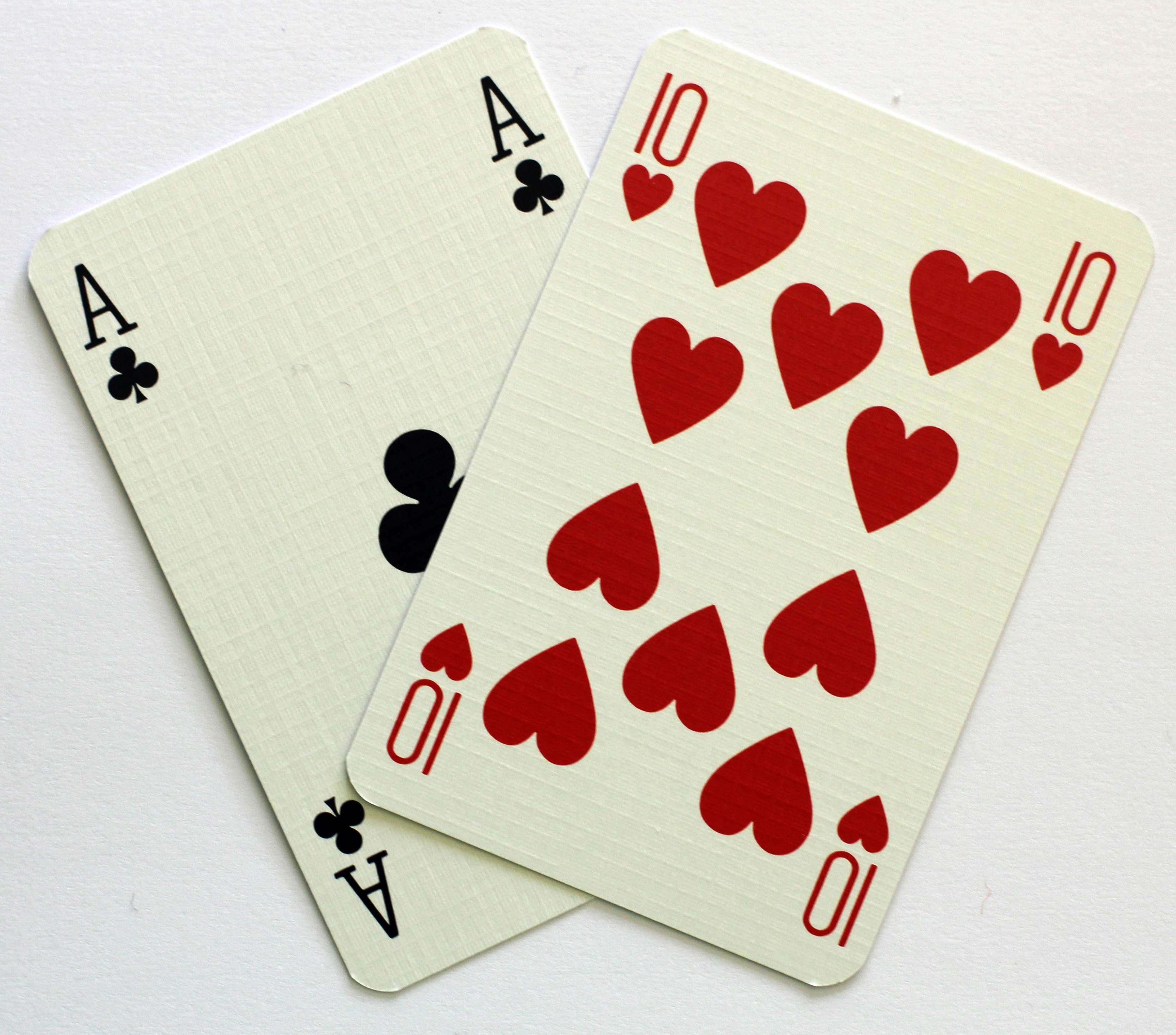|
Blackjack
Blackjack (formerly Black Jack and Vingt-Un) is a casino banking game. The most widely played casino banking game in the world, it uses decks of 52 cards and descends from a global family of casino banking games known as Twenty-One. This family of card games also includes the British game of Pontoon, the European game, Vingt-et-Un and the Russian game Ochko. Blackjack players do not compete against each other. The game is a comparing card game where each player competes against the dealer. History Blackjack's immediate precursor was the English version of '' twenty-one'' called ''Vingt-Un'', a game of unknown (but likely Spanish) provenance. The first written reference is found in a book by the Spanish author Miguel de Cervantes. Cervantes was a gambler, and the protagonists of his " Rinconete y Cortadillo", from ''Novelas Ejemplares'', are card cheats in Seville. They are proficient at cheating at ''veintiuna'' (Spanish for "twenty-one") and state that the object of the gam ... [...More Info...] [...Related Items...] OR: [Wikipedia] [Google] [Baidu] |
Ed Thorp
Edward Oakley Thorp (born August 14, 1932) is an American mathematics professor, author, hedge fund manager, and blackjack researcher. He pioneered the modern applications of probability theory, including the harnessing of very small correlations for reliable financial gain. Thorp is the author of ''Beat the Dealer'', which mathematically proved that the house advantage in blackjack could be overcome by card counting. He also developed and applied effective hedge fund techniques in the financial markets, and collaborated with Claude Shannon in creating the first wearable computer. Thorp received his Ph.D. in mathematics from the University of California, Los Angeles in 1958, and worked at the Massachusetts Institute of Technology (MIT) from 1959 to 1961. He was a professor of mathematics from 1961 to 1965 at New Mexico State University, and then joined the University of California, Irvine where he was a professor of mathematics from 1965 to 1977 and a professor of mathematics ... [...More Info...] [...Related Items...] OR: [Wikipedia] [Google] [Baidu] |
Advantage Players
Advantage gambling, or advantage play, refers to legal methods used to gain an advantage while gambling, in contrast to cheating. The term usually refers to house-banked casino games, but can also refer to games played against other players, such as poker. Someone who practises advantage gambling is often referred to as an advantage player, or AP. Unlike cheating, which is by definition illegal, advantage play exploits innate characteristics of a particular game to give the player an advantage relative to the house or other players. While not illegal, advantage play is often discouraged and some advantage players may be banned by certain casinos. A skillful or knowledgeable player can gain an advantage at a number of games. Card games have been beaten by card sharps for centuries. Some slot machines and lotteries with progressive jackpots can eventually have such a high jackpot that they offer a positive return or overlay when played long term, according to gambling mathematics. ... [...More Info...] [...Related Items...] OR: [Wikipedia] [Google] [Baidu] |
Twenty-One (card Game)
Twenty-one, formerly known as vingt-un in Britain, France and America, is the name given to a family of popular card games of the gambling family, the progenitor of which is recorded in Spain in the early 17th century. The family includes the casino games of blackjack and pontoon as well as their domestic equivalents. Twenty-one rose to prominence in France in the 18th century and spread from there to Germany and Britain from whence it crossed to America. Known initially as ''vingt-un'' in all those countries, it developed into pontoon in Britain after the First World War and blackjack in Canada and the United States in the late 19th century, where the legalisation of gambling increased its popularity. History Spanish origins The game is first mentioned by name in a 1611 Spanish dictionary where, under the entry for "card" (''carta''), it mentions the game of ''ventiuno'' ("twenty-one"). Just two years later, the first brief description of the game is given in a novella by Spa ... [...More Info...] [...Related Items...] OR: [Wikipedia] [Google] [Baidu] |
Siebzehn Und Vier
Twenty-one, formerly known as vingt-un in Britain, France and America, is the name given to a family of popular card games of the gambling family, the progenitor of which is recorded in Spain in the early 17th century. The family includes the casino games of blackjack and pontoon as well as their domestic equivalents. Twenty-one rose to prominence in France in the 18th century and spread from there to Germany and Britain from whence it crossed to America. Known initially as ''vingt-un'' in all those countries, it developed into pontoon in Britain after the First World War and blackjack in Canada and the United States in the late 19th century, where the legalisation of gambling increased its popularity. History Spanish origins The game is first mentioned by name in a 1611 Spanish dictionary where, under the entry for "card" (''carta''), it mentions the game of ''ventiuno'' ("twenty-one"). Just two years later, the first brief description of the game is given in a novella by Spa ... [...More Info...] [...Related Items...] OR: [Wikipedia] [Google] [Baidu] |
Vingt-et-Un
Twenty-one, formerly known as vingt-un in Britain, France and America, is the name given to a family of popular card games of the gambling family, the progenitor of which is recorded in Spain in the early 17th century. The family includes the casino games of blackjack and pontoon as well as their domestic equivalents. Twenty-one rose to prominence in France in the 18th century and spread from there to Germany and Britain from whence it crossed to America. Known initially as ''vingt-un'' in all those countries, it developed into pontoon in Britain after the First World War and blackjack in Canada and the United States in the late 19th century, where the legalisation of gambling increased its popularity. History Spanish origins The game is first mentioned by name in a 1611 Spanish dictionary where, under the entry for "card" (''carta''), it mentions the game of ''ventiuno'' ("twenty-one"). Just two years later, the first brief description of the game is given in a novella by Spa ... [...More Info...] [...Related Items...] OR: [Wikipedia] [Google] [Baidu] |
Pontoon (card Game)
Pontoon, formerly called Vingt-Un, is a card game of the banking family for three to ten players and the "British domestic version of Twenty-One," a game first recorded in 17th-century Spain, but which spread to France, Germany and Britain in the late 18th century, and America during the early 19th century. It is neither a variant of nor derived from Blackjack. Both are descended from the early British version of ''Vingt-Un''. In Britain, it first became known as Pontoon during the First World War, the name apparently being a soldier's corruption of its former French name. The game has no official rules and varies widely from place to place. It is a popular family game, but also widely played by children, students, and members of the armed forces. In 1981, Pontoon was the third most popular card game in Britain after Rummy and Whist. It has been described as "an amusing round game and one which anyone can learn in a few minutes." History Vingt-Un is first recorded in the secon ... [...More Info...] [...Related Items...] OR: [Wikipedia] [Google] [Baidu] |
Casino Game
Games available in most casinos are commonly called casino games. In a casino game, the players gamble cash or casino chips on various possible random outcomes or combinations of outcomes. Casino games are also available in online casinos, where permitted by law. Casino games can also be played outside casino for entertainment purposes like in parties or in school competitions, some on machines that simulate gambling. Categories There are three general categories of casino games: gaming machines, table games, and random number games. Gaming machines, such as slot machines and pachinko, are usually played by one player at a time and do not require the involvement of casino employees to play. Tables games, such as blackjack or craps, involve one or more players who are competing against the house (the casino itself) rather than each other. Table games are usually conducted by casino employees known as croupiers or dealers. Random number games are based upon the selection of rand ... [...More Info...] [...Related Items...] OR: [Wikipedia] [Google] [Baidu] |
Gambler
Gambling (also known as betting or gaming) is the wagering of something of value ("the stakes") on a random event with the intent of winning something else of value, where instances of strategy are discounted. Gambling thus requires three elements to be present: consideration (an amount wagered), risk (chance), and a prize. The outcome of the wager is often immediate, such as a single roll of dice, a spin of a roulette wheel, or a horse crossing the finish line, but longer time frames are also common, allowing wagers on the outcome of a future sports contest or even an entire sports season. The term "gaming" in this context typically refers to instances in which the activity has been specifically permitted by law. The two words are not mutually exclusive; ''i.e.'', a "gaming" company offers (legal) "gambling" activities to the public and may be regulated by one of many gaming control boards, for example, the Nevada Gaming Control Board. However, this distinction is not universal ... [...More Info...] [...Related Items...] OR: [Wikipedia] [Google] [Baidu] |
Banking Game
The following is a glossary of terms used in card games. Besides the terms listed here, there are thousands of common and uncommon slang terms. Terms in this glossary should not be game-specific (e.g. specific to Bridge (card game), Bridge, Hearts (card game), Hearts, Poker (card game), Poker or Rummy), but apply to a wide range of card games. For glossaries that relate primarily to one game or family of similar games, see #Game-specific glossaries, Game-specific glossaries. A ; Ace # The card with one pip in a pack of cards. Usually the highest card of a #suit, suit, #rank, ranking immediately above the #King, King. May also occupy the lowest rank. # Commonly refers to the #deuce, Deuce or Two in #German-suited pack, German-suited packs which don't have real Aces. Often the highest card of a suit. ; Acorns (card suit), Acorns : One of the four #suit, suits in a #German pack, German-suited pack of cards. Symbol: ; active # A card that is in play i.e. not #sleeping, sle ... [...More Info...] [...Related Items...] OR: [Wikipedia] [Google] [Baidu] |
Shoe (cards)
A dealing shoe or dealer's shoe is a gaming device, mainly used in casinos, to hold multiple decks of playing cards. The shoe allows for more games to be played by reducing the time between shuffles and less chance of dealer cheating. In some games, such as blackjack (where card counting is a possibility), using multiple decks of cards can increase the house edge. History Prior to 1961 in Las Vegas casinos, all blackjack was being dealt from a single deck. John Scarne proposed to the Nevada Gaming Control Board that a state ruling be enacted such that Blackjack must be dealt from a shoe (Scarne's invention). While no such ruling was ever passed, most Nevada casinos now deal from a multi-deck shoe. As gaming advisor to the Havana Hilton, Scarne also introduced the shoe to Puerto Rico and Cuba Cuba ( , ), officially the Republic of Cuba ( es, República de Cuba, links=no ), is an island country comprising the island of Cuba, as well as Isla de la Juventud and several mi ... [...More Info...] [...Related Items...] OR: [Wikipedia] [Google] [Baidu] |
Zincblende
Sphalerite (sometimes spelled sphaelerite) is a sulfide mineral with the chemical formula . It is the most important ore of zinc. Sphalerite is found in a variety of deposit types, but it is primarily in sedimentary exhalative, Mississippi-Valley type, and volcanogenic massive sulfide deposits. It is found in association with galena, chalcopyrite, pyrite (and other sulfides), calcite, dolomite, quartz, rhodochrosite, and fluorite. German geologist Ernst Friedrich Glocker discovered sphalerite in 1847, naming it based on the Greek word ''sphaleros'', meaning "deceiving", due to the difficulty of identifying the mineral. In addition to zinc, sphalerite is an ore of cadmium, gallium, germanium, and indium. Miners have been known to refer to sphalerite as ''zinc blende'', ''black-jack'', and ''ruby blende''. Marmatite is an opaque black variety with a high iron content. Crystal habit and structure Sphalerite crystallizes in the face-centered cubic zincblende crystal structur ... [...More Info...] [...Related Items...] OR: [Wikipedia] [Google] [Baidu] |





